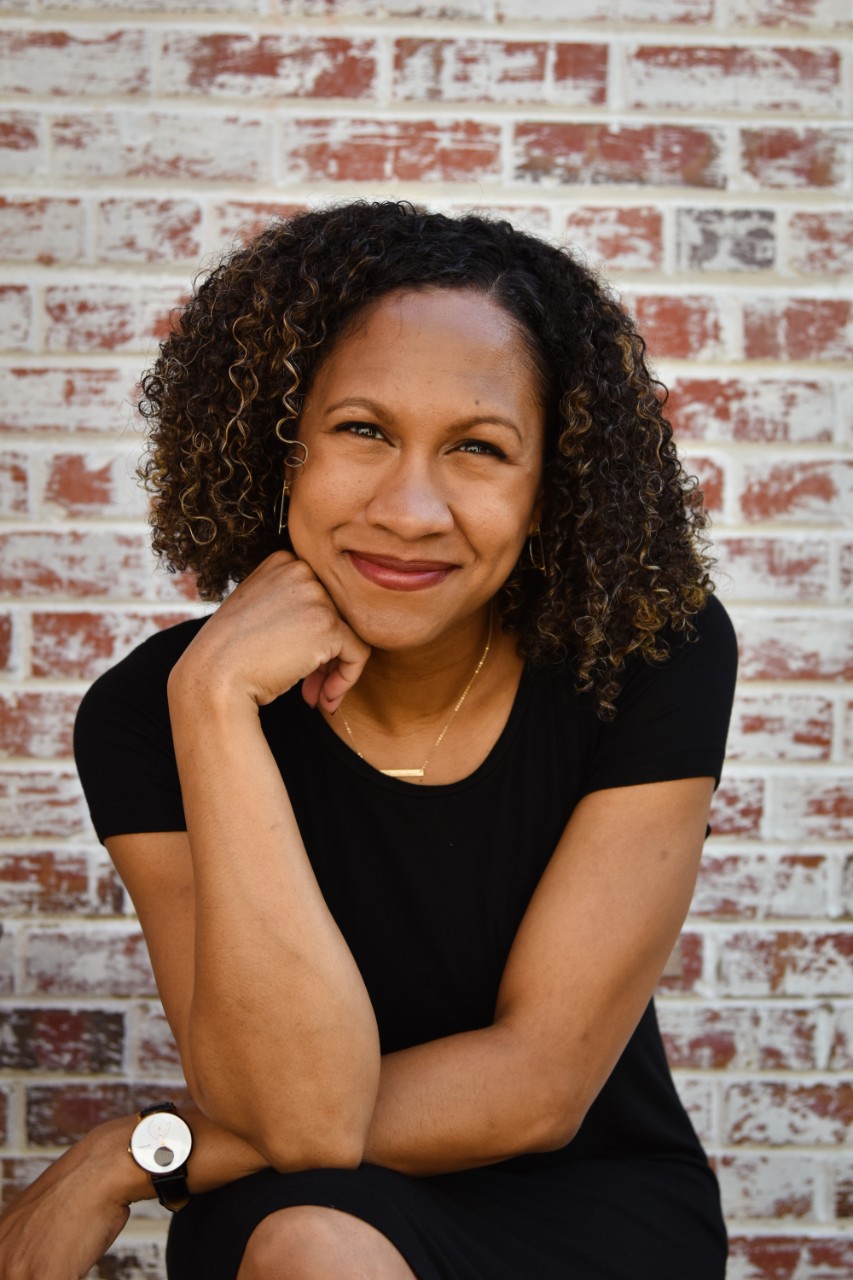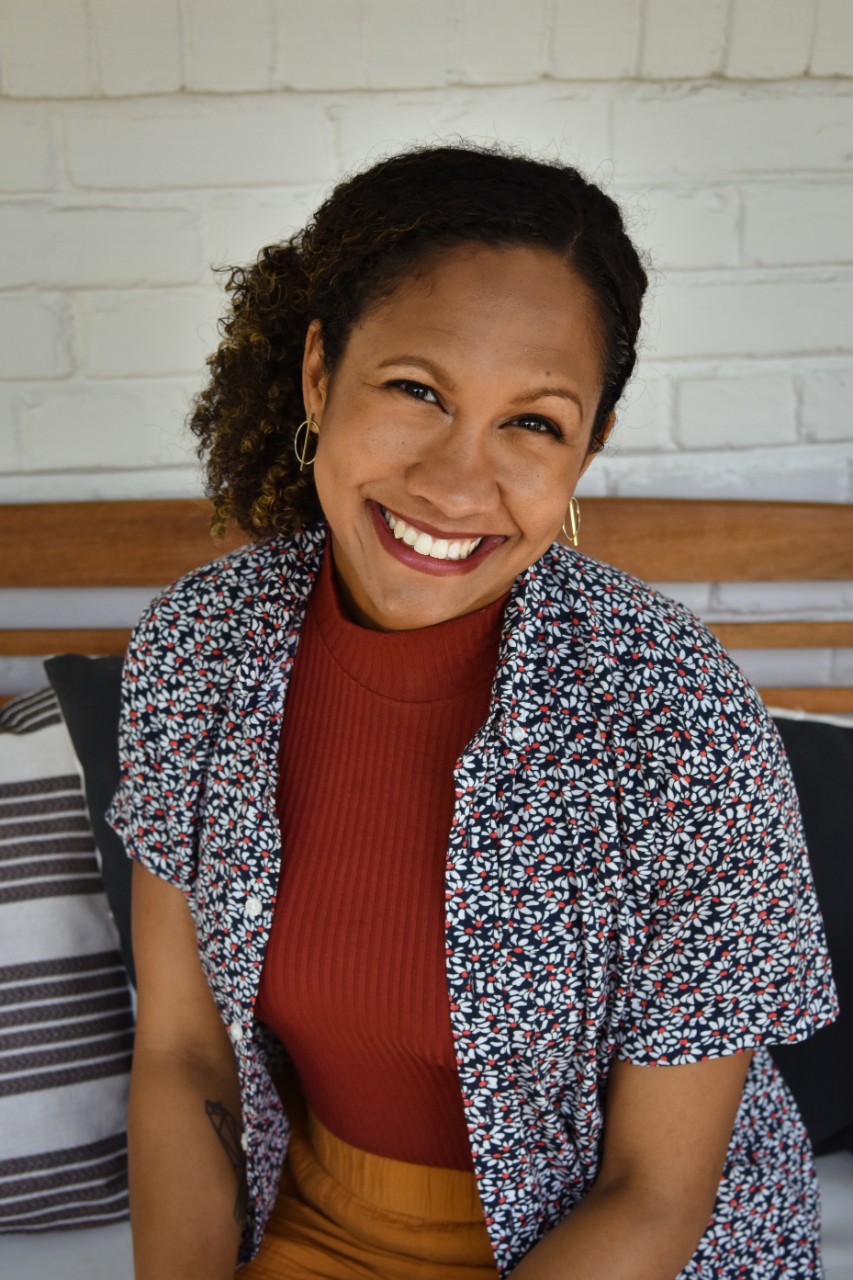
Aliese Lash. Photo by Tiara Castillo.
It was fall 2021 and Aliese Lash had just found out that she was pregnant.
She knew that she wanted to prioritize motherhood after the birth of her child, so she created a plan to juggle life and work.
As a psychotherapist in Boston, Lash resolved to leave her job as the lead clinician at a group practice and open a private practice where she could set her own hours.
She learned as much as she could about running a private practice, listening to podcasts, watching YouTube videos, and conducting informational interviews with people who knew what it would take.
At the same time, she prepared for the arrival of her son, Leon. “Every day that I spent with Leon, I could feel my mind and my body preparing to pour love and affection and care into him,” said Lash, who earned her master’s degree from the Boston College School of Social Work in 2017. “And I was very excited. I felt this really beautiful bond with him very early.”
Then Lash, who carried Leon for 29 weeks, had a stillbirth in April. She paused her plans to open a private practice and took leave from her job at the group practice.
“I spent every day just grieving and going for walks and spending a lot of time journaling,” she recalls.
After much reflection, Lash opened Liberated Light Counseling in June. It was hard for her to focus on herself, she said, to give herself the time, love, and energy she planned to bestow up Leon. But it’s what she had to do.
“I just felt so many examples of his spirit telling me that I had to pour that back into myself, which I didn’t want to do,” she said. “But I had to sort of humble myself and really think about how to nurture and care for and invest in myself. What does that look like? What does that even mean? And that is what motivated me to take the risk to start my practice.”
Liberated Light Counseling is dedicated to supporting the mental health of millennials who identify as Black, Indigenous, or People of Color, with a particular focus on freeing clients from their doubts, anxieties, and insecurities.
Lash keeps a caseload of 15 clients, many of whom followed her from the group practice. Her therapeutic strategy is partially rooted in liberation psychology, a framework that posits that oppressive social, political, and cultural conditions are the primary causes of psychological suffering.
Leon, she said, was her main reason for launching a private practice. But she also felt like going it alone was her best chance to combat the growing mental health crisis in the BIPOC community, a scourge that’s only worsened amid America’s racial reckoning and ongoing COVID-19 pandemic.
“The rise of the COVID-19 pandemic and the Black Lives Matter movement really stirred up a lot of conviction in myself about how I could best support my community,” said Lash, who plans to offer group therapy in the near future. “I sort of had this moment where I was staring in the mirror and I was like, ‘Aliese, what are we doing about this? There’s this giant need.”
“I just felt so many examples of his spirit telling me that I had to pour that back into myself, which I didn’t want to do. But I had to sort of humble myself and really think about how to nurture and care for and invest in myself. What does that look like? What does that even mean? And that is what motivated me to take the risk to start my practice.”
Her top priority is helping her clients increase their self-awareness, with a particular emphasis on what they value and why they behave the way they do. She aims to pass on some of the strategies that she has used to cope with the loss of Leon, such as taking long walks outside.
Lash offers walk-and-talk therapy to her clients every Wednesday, a technique that’s been linked to a reduction in symptoms associated with stress, depression, and anxiety. During these sessions, she and her clients meet outside at a park in the city, where they can chat while getting some exercise.
“A big passion of mine is the connectedness between nature and fresh air and movement, which can contribute to our healing and our processing,” said Lash, who captains a running club in Boston called PIONEERS Run Crew. “I love that my clients have been really receptive to walking together during our sessions.”
Lash took an unconventional route to social work. She was homeschooled until 18 and didn’t set foot in a classroom until she enrolled at Northern Virginia Community College in 2008. Her mentors at the time suggested she become a teacher, a nurse, or a doctor, but those professions didn’t resonate with her. “I love that for other people,” she told them, “but that’s not so much for me.”
Her introduction to social work came in her second year at community college. She was volunteering with her church, distributing food and clothing to homeless people living outside Washington, D.C., when she met a woman who piqued her curiosity.
The woman knew all the homeless people by name, even knew their life stories. Her business card said she was a social worker.
“I remember thinking, ‘Oh my God, to connect with folks who are homeless is an entire person’s job,” Lash recalled. “Her presence really impacted me. Her conversations were just so beautiful and pure and relational, and I aligned with that pretty significantly.”
Lash received an associate’s degree in social sciences in 2011 and then took some time off to figure out what she wanted to do next. She moved to Costa Rica for six months to explore her options and, on a whim, applied to the bachelor of social work program at George Mason University.
Lash got in and immediately knew that she had found her true calling. She remembers her very first class, in which she and her peers discussed the core values of social work.
“I remember thinking, ‘Oh my gosh, where have you all been my whole life? These are my people,’” Lash recalled. “These are my people who are passionate about human behavior, but also really dedicated to amplifying social justice and supporting people who are struggling with mental illness.”
Lash credited BCSSW with giving her the clinical skills to excel as a psychotherapist. She said that two of the most important things she learned in class were how to write a curriculum for group therapy and how to practice reflective listening, which involves clarifying and restating what her clients are saying.
“Being a good reflective listener involves listening to a whole person, not just their words, but their body language, their tone,” said Lash, who completed the Advanced Standing program in one year. “Being really in tune with somebody’s presentation is something that I’m grateful that I learned.”

Aliese Lash. Photo by Tiara Castillo.
Lash recently rekindled her relationship with BCSSW, becoming a field adviser and alumni board member. She relishes the opportunity to work with students, faculty, staff, and alumni, who, she said, challenge her to think of new ways to improve the field of social work.
Lash was compelled to reconnect with her alma mater after the school launched the Black Leadership Initiative, a cohort-based program that takes an Afrocentric approach to social work. The initiative, launched in fall 2021, centers the cultural experiences and values that connect people of African descent. Ubuntu, an African philosophy based on the concept of shared humanity, lies at the heart of the curriculum.
“I felt especially excited to share my own skills and stories to motivate and inspire the next generation of Black social workers because their voices and insights are uniquely valuable in the movement of decolonizing social work practice,” she said. “I genuinely want all BIPOC social workers to win because they provide the representation, solidarity, and wisdom that is required for the holistic healing of our greater society, and I am grateful that BCSSW recognizes that.”
The job can take a mental toll, with studies showing that 75 percent of social workers experience burnout at some point in their careers. Lash prevents overworking by meditating, running, and taking a daily lunch break. She uses all her vacation time.
“I really believe that our culture perpetuates chronic stress and makes it difficult for people to take a break and separate themselves from their work,” she said. “But I’ve never wanted to ascribe to that for myself. And so if I have vacation time, I use every single day of it.”
Lash sees a therapist once a week, where she continues to process Leon’s death. Her grief is still raw. It’s only been six months since she lost her child. But she has remained strong, looking for lessons amid unimaginable pain.
“The way that his spirit continues to teach me—I think that’s a big motivation for me,” she said. “It’s the biggest, most unexpected aha moment that I can have.”


